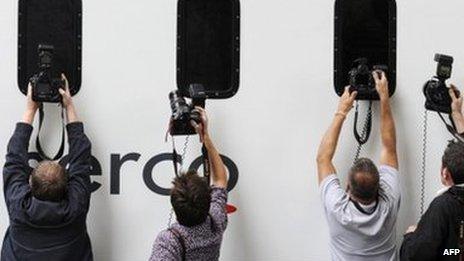Riot convictions: How tough are they?
- Published

Press photographers take pictures of rioters being driven away in a prison van
The courts dealing with rioters appear to be sending them to jail for longer than expected.
There has already been clear evidence of some long sentences - but remember - of the 1,300 who have already appeared in court, only about one in 10 of them have been convicted and sentenced.
Large numbers of the defendants are being sent to Crown Court because magistrates courts have limited sentencing powers.
Many of those cases are not likely to be dealt with by judges until September and October because of the sheer workload.
Judges have enormous discretion in how to deal with offenders. Maximum sentences are fixed by Parliament and there are discounts for early guilty pleas. But after that it is basically up to the judge. The Sentencing Council provides guidelines and the Court of Appeal develops important precedents - but judges can depart from guidelines with good reason.
Burglary convictions
Many of the looters have been convicted of burglary which carried a maximum sentence of 14 years. The Sentencing Council has been recently consulting the public, external on new guidelines.
The consultation said that burglars should normally be jailed because of their impact on victims. Breaking into business premises tends to lead to shorter sentences than homes. The longest sentences are reserved for those who go equipped with weapons.
Here are a few of the sentences to date:
Manchester Crown Court has dealt with more cases than other courts so far - and its judges agreed their own guidelines last week to reflect the severity of the disturbances in Salford and Manchester.
The Manchester guidelines , externalare clearly tougher than what was envisaged by the Sentencing Council whose consultation did not cover burglary and looting in mass riots.
The Manchester judges said anyone who takes part in breaking into a shop should expect four to seven years - and those who follow them inside will get between two and five. The Downey case was considerably different to the others: the serial offender had left prison on the morning of the riots.
Theft and related offences
Then there are those people who did not break in - but committed related offences, such as stealing, handling or receiving stolen goods. The maximum sentence for theft is seven years.
The current guidelines, external say that the starting point for jail is when there is some element of planning or significant damage. Again, the guidelines don't cover the specifics of a mass looting - but they do allow judges discretion to take into account aggravating factors.
Here are some of the recent cases:
The three young women from Croydon, like Michael Fitzpatrick in the burglary table, had no previous convictions - but judges can also use sentences to send clear messages that criminality will not be tolerated.
Judge Andrew Gilbart QC, Manchester's top judge, said the area suffered a "sustained onslaught of burglary, robbery, theft, disorder and other offences" and that it would be wrong for him to sentence individuals without taking the events into account. Beswick has taken his sentence to the Court of Appeal.
The facebook factor
A huge part of the story of the riots has been social media. Rioters in London were using Blackberrys to organise their hits, out of sight of the law.
Other were less careful to hide their thoughts, as the following cases show:
Following the 2001 Bradford riots, the Court of Appeal said that the sentencing starting point for taking part in disturbances should be three years. But there are no specific sentencing guidelines for using social media to encourage a riot.
The Manchester men were jailed under the Serious Crime Act which says that encouraging an offence carries the same penalty as the crime itself. Both men pleaded guilty at the earlier opportunity, were shocked by the sentences and are expected to go to appeal.
David Glyn Jones in Bangor, where there were no disturbances, was charged with sending a malicious message under the Communications Act, punishable by up to six months in jail.
What we don't know at the moment is how judges in other cities will react when the bulk of the cases come before them in the coming weeks.
The Manchester guidelines have been shared on the judiciary's intranet - which means judges around the country will be aware of them. But the only sentencing decisions that really matter, in terms of setting precedent, are those made by the Court of Appeal.
And its judges are waiting for the cases to come in.
Follow Dominic Casciani on Twitter at @BBCDomC, external